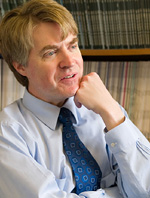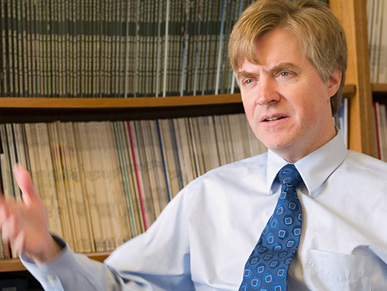How Do You Sleep? A Conversation with Tom Neylan, MD
"O Sleep, rest of all things, mildest of the gods, balm of the soul..."
When the Roman poet Ovid crafted this tribute to Hypnos, the Greek god of sleep, he captured the essence of sleep's restorative power. Yet in the 20 centuries since the reign of Augustus, the what and why behind a "good sleep" — and its evil twin, insomnia (named coincidentally for Somnus, the Roman god of sleep) — have eluded scientists.

Tom Neylan
But as Sojourner Truth once wrote, it's often darkest just before dawn. These days, sleep experts like San Francisco Veterans Affairs Medical Center (SFVAMC) psychiatrist Tom Neylan, MD, are shedding more light on the biology of sleep and uncovering what sleep disorders can do to our health.
"It's an exciting time for researchers like me, who are trying to understand the role of sleep in our lives," he says. Sadly, for most of the last 13 years, Neylan, who operates out of an Art Deco-era medical building in the UCSF-affiliated facility in northwestern San Francisco, has developed his insights from the damaged lives of patients with post-traumatic stress disorder (PTSD). For these hypervigilant patients — many of whom are women — uninterrupted, restorative sleep can be a near impossibility.
"Every living creature has a restorative cycle of some sort," the youthful Neylan explains. "Since these cycles are conserved across species, they're probably related to something universal, like the light and darkness cycles on Earth itself."
We live this truth every day. Circadian rhythms are hardwired into our DNA, after all. And while we understand that 24-hour cycles govern the physiological processes of all living beings, have you ever wondered, as Neylan and many others have, why this might be so?
One popular theory is that our circadian rhythms stem from the need of the earliest cells to protect their replicating DNA from ultraviolet radiation during the daytime. In short, just like today's adolescents, they saved all the action for nighttime, then rested.
Human sleep is more layered and complicated, of course, thanks in part to our dense and powerful brains. Indeed, as Neylan has confirmed in his own research, "The brain is the most vulnerable organ to sleep deprivation." Or, to put it a different way, you lose if you don't snooze. "People with sleep problems have more health problems, like heart disease, high blood pressure and premature aging," Neylan explains. "There's no way to cheat the system. Good sleep is an essential part of human biology. Some of the latest research even shows that regular sleep is important to metabolism, to keeping our weight in balance. The effect of insomnia on energy balance is something I really want to explore."
Keep in mind that when Neylan mentions sleep disorders, he's not talking about an occasional restless night. As medical director of the PTSD Program at SFVAMC, he has spent years studying sleep disturbances in patients who are chronically sleep-deprived.

Tom Neylan
"It's difficult for people without PTSD to understand how severe trauma can create an anxious state that makes sleep difficult. You're haunted by memories. You're always scanning the environment for safety. You have nightmares. You withdraw. You're edgy. You don't trust anyone. And this doesn't always get better with time."
In this world of real and imagined threats, our natural defense system bends to a self-destructive wind. "Look," says Neylan, "we evolved in a predator-prey environment. If the lions are next door, insomnia is a good thing. But what if we were always worried that they might be there? Or that they are there when they're not?" He leaves the question hanging in the air, unanswered.
But it is answers he seeks, which is why this Mill Valley, California, resident has now begun a study that compares the sleep-time hormone patterns of men and women with and without PTSD. His goal? "I am interested in finding effective interventions to help people with sleep disorders," he responds without hesitation.
One possibility is to block the effects of corticotropin-releasing factor, CRF for short, a peptide that underlies anxiety. Higher levels of CRF are associated with sleep disturbances, particularly when it comes to the deep sleep that the human system craves. "The brain seems to have evolved a pathway that keeps us aroused when we feel threatened, and CRF might be in the driver's seat," says Neylan. For that reason, CRF presents a novel target for drug developers, he adds.
Neylan keenly feels the need for new drugs — or any other successful nondrug intervention — to break the chain of pain that keeps trauma victims locked to their own memories. "I think people naturally associate PTSD with men and war, but sexual and physical assault, particularly rape, happens to women far more often. And the diagnosis and the effects on sleep and everything else are just the same when you're a civilian."
Those psychological aftershocks do not extend to the Hollywood staple: the violent flashback. "Severe flashbacks are relatively rare. It's the avoidant behavior you really have to worry about because they leave you feeling cut off from humanity. You become a bystander to life. And for reasons we don't really understand, women seem more vulnerable to PTSD than men." With the war in Iraq destined to yield women who have undergone both war and assault, Neylan knows what others can only sense. More patients are on the way.
It's a frustrating circumstance. It may be a naïve question, but doesn't anything protect people who have been traumatized? "My colleagues and I have studied the risk for PTSD symptoms in police. Strong social support networks and higher IQs offer some protection against the impact of traumatic events."
Evolution seems to have given us a skimpy flak vest. Nonetheless, Neylan finds hope in the patients themselves. "When I was doing my residency training in the late 1980s, very few people liked to work with PTSD patients. They thought they were always angry. But that has completely turned around now. Patients are interested in treatment. And doctors are interested in helping them. We work together as collaborators."
Maybe by counting on each other, they will one night no longer have to count themselves to sleep.
Top photo licensed from Aaron Edwards, other photos by Majed
Alternative content
Related Links
- Thomas C. Neylan, MD, Principal Investigator
- Posttraumatic Stress Disorder Research Program at NCIRE, SFVAMC and UCSF
- Participating in the Sleep Study
- Sleep and Posttraumatic Stress Disorder (PTSD)
- National Center for PTSD, US Department of Veterans Affairs
- Sleep Disorders: Anxiety and Stress
- About.com
- Post-Traumatic Stress Disorder
- Wikipedia
- Post-Traumatic Stress Disorder (PTSD)
- National Institute of Mental Health, National Institutes of Health
- Sleep disorders may predict development of PTSD
- Psychiatric News, June 7, 2002
- Sleep disorder creates "Mr. Hyde"
- BBC News, March 19, 2007
- The dream diet: Losing weight while you sleep
- WebMD, February 4, 2005